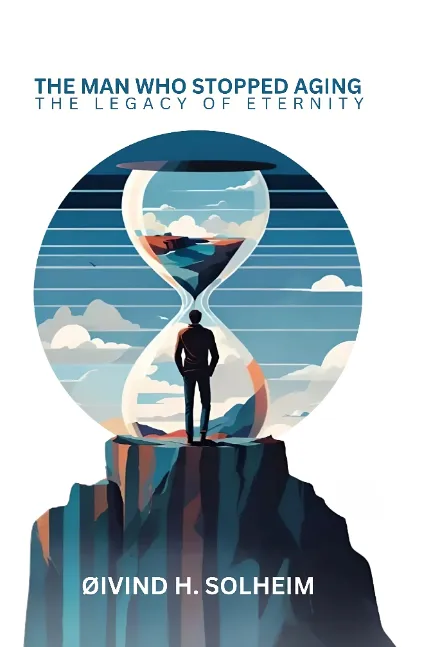The World Is Not Absurd. In search of meaning, according to Camus.
-
 Øivind H. Solheim
Øivind H. Solheim
| Sunday 25th of August 2024 01:19:12 PM (UTC)

Excerpt from Chapter 5, The Man Who Stopped Aging
“Some Western philosophers liken life to a blank book,” Sarah continued. “Albert Camus, for instance.”
“The thinker behind the man pushing a boulder uphill,” William said.
“Yes, the tale of Sisyphus,” Sarah replied. “Camus says our lives can feel like that — repetitive and laborious. But he argues we can still find happiness because the struggle itself is meaningful.”
“That’s an interesting lesson.”

Image @ by Øivind H Solheim
Excerpt from Chapter 60, The Man Who Stopped Aging
Today, he walks alone. His thoughts are his only companions. He delves into the existential questions that have haunted him since he was young.
He thinks of the philosophies of Albert Camus, whose writings on life and how we do our best in the pursuit of meaning amidst an indifferent universe.
These ideas have long resonated with him. Traversing this ancient trail, nature’s majesty around him, Camus’ “The Myth of Sisyphus” haunts him.
He’s shouldered his boulders — Lina and Sarah — love lost, his heart’s wreckage. Yet, like Sisyphus, he persists, undeterred in his climb.
Atop a crest, he pauses, contemplating life’s absurd theatre. Is it a mosaic of chance, a semblance of order, or is there a deeper, hidden tapestry, threading our existence with silent purpose?
Camus, dismissing universal meaning, found solace in life’s absurd dance, in defiant acceptance.
Lina, pragmatic, may have nodded to Camus’ view — life, a canvas of our own creation. Sarah, intuitive, might have sensed a subtle order, a cosmic shepherd. Their divergent perspectives, his guiding stars.
As he strolls on the well-known path, he marvels at the splendor of nature, and recalls Camus’ “The Myth of Sisyphus,” in which he depicts the perpetual and pointless strife of humans against the relentless boulders of life.
He too has exerted himself to lift his boulder up the slope, only to watch it tumble down again. The losses of Lina and Sarah, his soulmates, were rocks that broke him, but he keeps going, keeps trying.
He stops, gazes at the valley below, and wonders about the absurdity of existence. Is life just a series of random events linked by a false sense of order and purpose? Or is there a hidden meaning, a secret pattern that runs through our lives, connecting each strand in a deliberate design?
These moments may not matter in the cosmic story, but they are what make his life rich and varied. The stars in the black sky show him the immensity of the universe. They also show him how small and insignificant he is.
But he finds liberation in this insignificance. He is free to create his own meaning. He can choose his own purpose and live by his own values and beliefs.
This, he believes, is Camus’s idea — the freedom that arises from embracing the absurdity of life. At night, in the silence, he feels calm. The existential questions that trouble him remain unanswered, but he has learned to live with them.
He treasures the memories of Lina and Sarah, not as weights but as lights that guide him through the darkness. Their love, their wisdom, and their very being have been his anchors in a world that often seems lost.
Camus denied the idea of a universal meaning, encouraging instead to embrace the absurdity of life. Yet, in this embrace, he found a reason to live — in the rebellion against meaninglessness, in the acceptance of life’s absurdity.
As he continues his journey through the valley, he thinks of what Lina and Sarah would have said about this. Lina, ever the pragmatist, might have echoed Camus’ sentiments, asserting that life is what we make of it and the search for a grand design is futile.
Sarah, with her intuitive soul, might have argued for a hidden order, a guiding force that gently steers us through the tumultuous seas of life.
Their contrasting views, like two sides of the same coin, have often guided his thoughts. For in this absurdity lies the freedom to create, to love, and to live — fully and without reservation.
This is his rebellion against the absurd, his act of defiance in a universe that offers no clear answers. And in this rebellion, he finds his kingdom, his peace, and his reason to keep pushing the boulder up the hill.
As twilight descends, the sky blooms in a spectrum of fire and twilight. Does this beauty defy an indifferent cosmos, hint at a grand designer, or is it merely cosmic serendipity, a radiant fluke in the cosmic expanse?
In his kingdom, Camus’ allegorical haven, he finds refuge in nature’s rhythm, its cyclical life dance, and a fleeting sense of cosmic kinship. Yet, life’s grand question lingers. Camus’ creed: embrace life’s riddles and relish the journey.
In fleeting moments, in ephemeral connections, life finds its hue and texture. Under the starlit dome, the cosmic vastness underscores his insignificance yet liberates.
He forges his own meaning, charts his path, and lives by his creed. This is Camus’ legacy — freedom in life’s absurdity. In the night’s calm, he is at peace, his existential burdens now guiding lights. Lina and Sarah are his life’s anchors in a drifting world.
The Man Who Stopped Aging: The Legacy of Eternity, a Novel.
The Impact of Albert Camus
 Editions Gallimard, 1942. Image © Øivind H Solheim
Editions Gallimard, 1942. Image © Øivind H Solheim
More than fifty years ago I studied French literature and language at the University of Bergen. I then became familiar with the writing and philosophy of Albert Camus. I was particularly taken by the myth of Sisyphus.
“The Myth of Sisyphus” is the title of Albert Camus’s essay is based on the Greek myth of Sisyphus, which tells of a man whom the gods had condemned to forever roll a boulder up a mountainside. When Sisyphus reached the top, each time he had to witness the stone block roll back down.
Camus says that we can imagine Sisyphus happy as he strolls back down after he has rolled the stone up the mountainside. Then he has finished his toil and effort, and he descends with peace and calm in his mind and is about to start again.
An important message here is that one can think positively and find value in the tiring work we do every day. Camus emphasized that it is important that we live authentically, sincerely, and committedly, especially when we are faced with the absurdities of life.
For me, this philosophy is an exciting and precise picture of human existence, of human existence. I used thoughts and ideas from this essay when I authored the novel about the man who stopped growing older.
These thoughts about human life and human existence are still truly relevant in our time, perhaps not least because of the challenging events that are constantly happening around us in the world.
Free Book Promotion, The Man Who Stopped Aging
Thank you for your visit and attention. Should you wish to read my novel and compose a book review, you can download my book, Kindle Edition, for free on Sunday 25, 2024.
Start the conversation
Become a member of TxtTale to start commenting.
Already a member?
